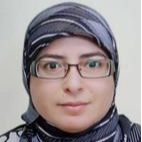
Ahlame Begdouri
Work place: SIA Laboratory, FST-Fès, University of Sidi Mohamed Ben Abdellah, BP.2202, Route d’Imouzzar, Fez-Morocco
E-mail: ahlame.begdouri@usmba.ac.ma
Website:
Research Interests:
Biography
Ahlame begdouri is currently professor of computer science at the Faculty of Sciences and Technology of Fez (FSTF), University of Sidi Mohamed Ben Abdellah, Morocco. She received her PhD on the topic of "QoS of multimedia traffic over best effort networks" from the Faculty of Sciences of Rabat, Morocco on 1999. Her current research topics concern context aware adaptation, communities of practice and mobile learning.
Prof. Begdouri is Head of the VIA research group at the SIA Lab (Système Intelligents et Applications) of the FSTF, Coordinator of an FP7 project MoICT (2011-2014), Chair of the IEEE Moroccan Education chapter (2015-2017), Founding Member and General Secretary of AMIIS (Association Marocaine d’Ingénierie et d’Innovation en Santé) on 2016. She received the TEPI Award (Technical English Program Initiative) from the Executive committee of IEEE-MS on 2016.
Author Articles
Dynamic Selection Approach to Overcome the Demotivation of Learners in a Community Learning System
By Dominique Groux-Leclet Ahlame Begdouri Rachid Belmeskine
DOI: https://doi.org/10.5815/ijisa.2018.07.03, Pub. Date: 8 Jul. 2018
Community of Practice (CoP) is a very rich concept for designing learning systems for adults in relation to their professional development. In particular, for community problem solving. Indeed, Communities of Practice are made up of people who engage in a process of collective learning in a shared domain. The members engage in joint activities and discussions, help each other, and share information. They build relationships that enable them to learn from each other. The most important condition for continuing to learn from a CoP is that the community should live and be active. However, one of the main factors of members demotivation to continue interacting through the CoP is the frequent receipt of a large number of aid requests related to problems that they might not be able to solve. Thing that may lead them to abandon the CoP. In an attempt to overcome this problem, we propose an approach for selecting a group of members who are the most appropriate to contribute to the resolution of a given problem. In this way, the aid request will be sent only to this group. Our approach consists of a static rules-based selection complemented with a dynamic selection based on the ability to solve previous similar problems through analysis of the history of interactions.
[...] Read more.Other Articles
Subscribe to receive issue release notifications and newsletters from MECS Press journals